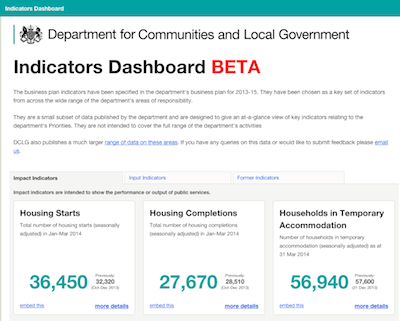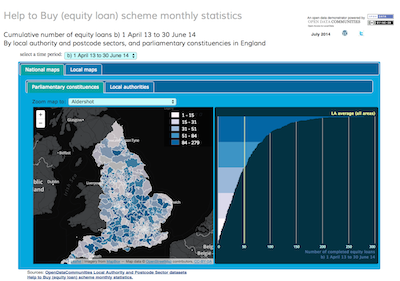Linked Data at the Department for Communities and Local Government - an introduction
Data matters to DCLG and its partner network. It is the facts and evidence to help us understand and address real-world issues and problems.
Data is particularly important in a local context. It is the foundation for:
- Policy professionals and front-line delivery staff to plan, monitor and secure local outcomes across an increasingly complex array of priorities and services in specific localities;
- Citizens and communities to better understand what local service providers do for them, how and why the do it, and - most importantly - engage pro-actively in shaping and delivering outcomes for local people.
- Local businesses to identify and build opportunities for new business in local areas.
The prize - a web of data
In order to understand problems and issues in particular localities, users will typically need data from multiple national and local organisations and systems.
We know this is common amongst our Local Authority users. As an example, let’s take Strategic Housing Market Assessments, which each council prepares to help them understand and develop policies for local housing markets To do this well, each assessment will typically draw on various DCLG datasets – e.g. forecasts of demand for housing – and blend them with the Local Authority’s own data on, say, planning applications or dwelling stock.
Charity organisations employ a similar mix of DCLG’s and their own local data sources. For instance, Homelessness charities need and use an extensive evidence-base about local areas to support their work on things like planning homelessness interventions and campaigns, or bidding for funding to undertake local projects. This evidence base will comprise data sources from various organisations – e.g. DCLG’s Local Authority statistics on homelessness, with similar data on housing repossessions held and maintained by Ministry-of-Justice
The vision is for a web of data, where it is possible to quickly and reliably discover and link-together related sources. This means moving away from the current web of separate disconnected documents i.e. no more downloading, then copying and pasting from spreadsheets!
In essence, we are looking to stop publishing our data to the web, and instead put our data in the web. Clearly, this is very different to conventional methods (e.g. no more spreadsheets!) and therefore poses various challenges. For example, how do we know that it is realistic and achievable? What tangible benefits will it deliver for our own organisation, our partners, and our data users: which, for DCLG includes local residents, communities and businesses? How do we build it in an affordable, sustainable manner, particularly in a period of constrained resources?
Making progress - DCLG’s approach
Here at DCLG, we are putting our data in the web by publishing it as Linked Data. To mitigate problems, we are doing this in discrete phases working in partnership with owners and users of specific Departmental datasets. This is about focussing and targeting our efforts, ensuring that: (a) we are releasing data that users want, at the right time and in the right form; (b) our data owners and publishers understand the added value and benefit of providing data in more open, accessible formats; and (c) we have the right technology, skills and capacity to continue growing and improving in response to user demand.
Our solution is OpenDataCommunities, comprising three main elements. Firstly, it is a publishing platform or channel for routinely releasing DCLG datasets that can be quickly discovered and linked to related sources. Secondly, it comprises basic visualisations illustrating how our Linked Data can be re-used in new, innovative ways. Finally, OpenDataCommunities is built on partnerships with user organisations such as the Local Government Association, focussed on testing and proving how DCLG’s data can be blended with third party-sources over the web – i.e. to breathe life into the “web of data” vision.
Introducing OpenDataCommunities
At the time of writing, OpenDataCommunities comprises 154 Linked Data sources drawn from DCLG’s statistical and geographic data portfolio. These have been selected by working closely with DCLG’s data owners and end-users: thereby ensuring that datasets can be published in new open and linkable forms, and will be actively used.
Alongside the data repository are low-cost, innovative tools that illustrate how our data can be utilised in new and innovative ways. Two examples are: (a) a dashboard of key indicators in DCLG’s business plan; and (b) visualisation of new Help-to-Buy statistics for Local Authorities, Parliamentary Constituencies and Postcode Sectors.
 |
 |
Our experience is that basic visualisation tools like these are important to help users understand potential re-uses, and are therefore an essential ingredient of stimulating others to develop innovative new tools and insights.
An equally significant aspect of OpenDataCommunities is: Partnerships with local public bodies (particularly Local Authorities) to test and demonstrate the power and potential of blending local and national sources. We are collaborating with various Local Authorities and national bodies such as the Local Government Association, to illustrate new ways of linking DCLG and local sources over the web.
Making a difference
OpenDataCommunities is already making a difference.
For instance, our Linked Data has been used alongside third party sources to better plan and target local services to meet the priorities and needs of local people. One example is the Hampshire Hub, where Linked Data from OpenDataCommunities is helping public bodies secure cost-savings and efficiencies for local taxpayers, and be more open and accountable.
The Hampshire Hub is a partnership of twenty organisations including all local authorities and the two national parks in the Hampshire Area, plus Police, Fire, the British Army, and DCLG. Its focus is on building new ways to share and use data from multiple organisations to help better understand and address real-world local issues.
For example, The Hampshire Hub is beginning to share and re-use data from a myriad of sources, including DCLG to: Support military personnel as they leave the armed services and adapt to civilian life – e.g. access to training and employment opportunities; and put in place more effective interventions for tackling alcohol-related problems and issues – e.g. emergency and health services collaboration to deal with binge drinking in inner city areas.
Securing the prize: challenges and lessons learnt
We have faced challenges along the way in four main inter-related areas.
Firstly, from a data publisher’s perspective we have found that creating Linked Data is challenging. Data owners need to look afresh at how their data is organised and structured, to determine how and where it can be reliably and responsibly linked to external sources. New skills are needed to manage the process of creating Linked Data, and ensuring it is actively used.
We have begun to tackle this by developing new technical skills “in-house”, working in close partnership with the supplier providing the technology underlying OpenDataCommunities. Our technical specialists then work closely with data owners – i.e. the experts in the actual datasets – to prepare and publish open, linkable outputs. Engagement with data owners and experts is also key to understanding the end-user communities, and therefore, how we should reach out to them to stimulate and encourage innovative uses.
Secondly, publishers generally lack the tools, capacity and expertise to help them quickly and easily generate and maintain linked data from what (in DCLG at least) is a diverse range of source databases and systems. Our work on tackling this issue has focussed on automating the creation of open, linked outputs from the original source. The point here is to avoid the need for publishers to develop and maintain lots of specialist knowledge and complex processes for converting individual spreadsheets. We have built tools that essentially “read” and convert these sources with minimal human intervention, and then publish them directly to OpenDataCommunities.
Thirdly, from a data user’s perspective, we have found that consuming and re-using linked data is not straightforward. Again, this is partly due to a lack of established tools and standards: for example, to combine and re-use multiple linked data sources over the web. Our solution here is to incorporate tools in OpenDataCommunities for non-technical users to quickly blend and retrieve data from multiple DCLG datasets. One example is our new Geography Selector, enabling users to navigate to then extract data for their particular places of interest.
Finally, we have found that there is need to improve awareness about the benefits and opportunities of open, linked data. The basic concepts and advantages of inter-linking disparate data sources are not well understood amongst senior decision-makers, data publishers, end-users, and software intermediaries. We are tackling this issue by building up a portfolio of evidence about the benefits of linked data over more conventional publishing approaches (e.g. spreadsheets). This evidence is captured from various sources including: statistics on OpenDataCommunities; feedback from users of our demonstration applications; and intelligence gathered through working with partners such as the Local Government Association and Hampshire County Council.